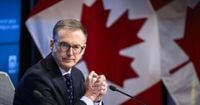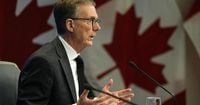The Bank of Canada issued a stark warning on Thursday, May 8, 2025, regarding the potential economic fallout from ongoing trade tensions with the United States. In its annual Financial Stability Report (FSR), the central bank highlighted how U.S. President Donald Trump's aggressive tariff policies could disrupt financial stability in Canada, leading to severe repercussions for households and businesses.
Governor Tiff Macklem, during a press conference in Ottawa, stated, "A long-lasting trade war poses the greatest threat to the Canadian economy. It also increases risks to financial stability." He emphasized that the unpredictable nature of U.S. trade policy could exacerbate market volatility and liquidity strains, potentially pushing the economy toward recession.
The report outlined two primary scenarios: one where a trade deal is reached and tariffs are lifted, resulting in stalled growth, and another where a protracted trade war ensues, leading to a contraction in GDP. The latter scenario could see the Canadian economy shrink by an average of -1.2 percent over four quarters, with households struggling to keep up with debt payments.
Macklem warned that if loan losses occur on a large enough scale, banks might tighten lending practices, further complicating the economic landscape. He remarked, "If credit losses occur on a large enough scale, banks could cut back on lending in response. This would exacerbate the economic downturn and put more pressure on businesses and households." The governor's comments reflect a growing concern that the financial system could shift from a "shock absorber to a shock amplifier" in the face of rising defaults.
Despite these risks, the central bank noted that Canadian banks are currently well-positioned to absorb increased credit losses, having bolstered their capital buffers in recent years. Senior Deputy Governor Carolyn Rogers pointed out that banks have increased provisions for credit losses, enhancing their resilience against potential market shocks.
However, the report raised alarms about the increasing presence of hedge funds in the Government of Canada bond market. These funds have taken on significant leverage to purchase bonds, raising concerns that they may withdraw from these crucial markets during periods of stress, thereby introducing additional volatility.
Rogers highlighted the recent fluctuations in the U.S. Treasury market as an example of the risks posed by hedge funds. "If the trade war causes a larger spike in volatility than we’ve seen so far, hedge funds need to make sure that they are prepared to respond to sudden liquidity needs without disrupting market functioning," she cautioned.
In terms of household financial health, the report indicated that the ratio of household debt to disposable income has decreased from 179 percent to 173 percent, suggesting a slight improvement in financial stability. However, approximately 60 percent of mortgages in Canada are set to renew in 2025 or 2026, with many homeowners expected to face increased payments. The report noted that over 90 percent of mortgage holders with a five-year fixed-rate mortgage will encounter payment increases at renewal that are smaller than what they were stress-tested for.
On the other hand, the report highlighted a concerning trend among households without mortgages, where financial stress has increased, particularly in the form of rising arrears on auto loans and credit cards. This demographic is now experiencing arrears levels that are above historic averages.
Moreover, the FSR explored the worst-case scenario for mortgage renewals in the event of a prolonged trade war, which could lead to higher unemployment and declining house prices. The report suggested that the share of mortgages in arrears by at least 90 days could escalate to levels comparable to those observed during the 2008-09 global financial crisis if such a scenario materializes.
Macklem's assessment was cautious, noting, "When you’re doing the FSR you put your gloomy hat on. You think about okay, what could go wrong, and then you ask how well prepared are we." He acknowledged that while there have been positive developments on the trade front, the situation remains volatile and uncertain.
In a recent meeting between Prime Minister Mark Carney and President Trump, both leaders agreed on the importance of ongoing trade negotiations. Macklem expressed optimism about this dialogue but cautioned that significant hurdles remain. "I think it was important that the prime minister and the president of the United States connect; I think it’s important that they understand each other’s positions and it’s important that the lines of communication were open," he stated.
As the Bank of Canada navigates these turbulent economic waters, it remains vigilant about the potential for a trade war to derail progress made in recent years. The central bank's report serves as a reminder of the interconnectedness of global markets and the far-reaching implications of trade policies. With the financial system under scrutiny, stakeholders are left to ponder the path forward amid uncertainty.


